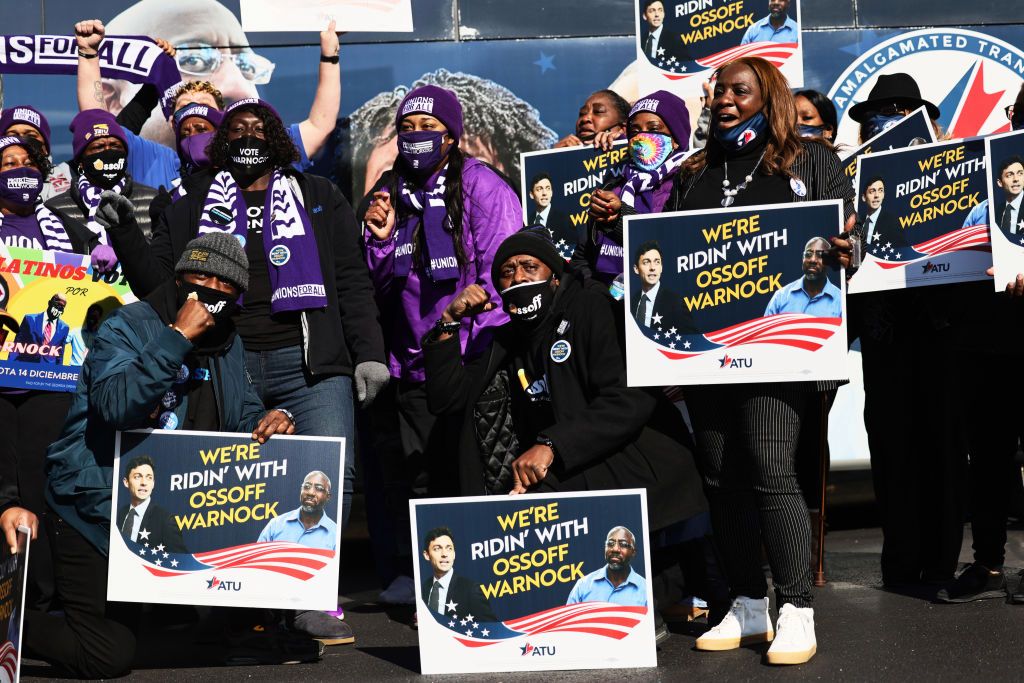
Source: Michael M. Santiago / Getty
ATLANTA — Black voters in Georgia closed out the 2020 election cycle with a resounding victory, electing Rev. Raphael Gamlial Warnock as the first Black senator from Georgia.
Warnock ran an issue-focused campaign building on his history of organizing as the leader of Atlanta’s Ebenezer Baptist Church, also known as America’s Freedom Church.
“When I think about the arc of our history, what Georgia did last night is its own message in the midst of a moment in which so many people are trying to divide our country, at a time we can least afford to be divided,” the senator-elect said during an interview with CNN’s John Berman Wednesday morning.
With votes still being counted, Warnock led his opponent by more than 50,000 votes. CBS News reported that exit polling showed Warnock winning larger percentages of Black voters and voters under 30 than President-elect Joe Biden just two months earlier. With the senate race between Republican incumbent David Perdue and Jon Ossoff not officially called as of Wednesday afternoon, the Democratic challenger was leading his opponent by about 16,000 votes.
Like Georgia’s win in November, a Black-led multiracial coalition of grassroots organizers worked overtime to turn out voters for the runoff elections. “We were built for this,” Kimberlyn Carter, executive director of the Rep GA Institute, told NewsOne. “The fight for freedom courses through our veins…we have this legacy of winning against the odds.”
Rep GA Institute focuses on addressing systemic barriers that keep Black and other targeted communities of color from participating in the civic engagement process, including running for office. Carter said Rep GA will engage and train Black and other candidates of color and help people feel more comfortable with policymaking.
“These people are furious at us for showing our resilience and power,” Carter added.
The upcoming legislative cycle and redistricting will not be easy, she cautioned.
“It’s going to be bloody…it’s going to be evil,” Carter said. “And it is going to take everybody just like we’re talking every day about voting, it’s going to take everybody to understand what is at stake in redistricting.”
Georgia organizers are leveraging the runoff elections as an opportunity to reset civic participation beyond the 2020 election cycle. The impact of the organizing around the Georgia runoff elections will shape community engagement for years to come.
“This [win] was not made overnight,” Bianca Keaton, chair of the Gwinnett County Democratic Party, said. “And it is not a product of any national Democratic effort. This is the power of local organizing.”
Black voters, and in particular Black women, are credited with turning out this cycle. Keaton told NewsOne that Black women deserve more than well wishes, thanks and flowers. Taking a break in between picking up food for her team and other election day tasks, she said that people need to move past the performative nature in saying ‘trust Black women’ before stepping back and watching Black women work.
“’Trust Black women’ is not meant to be a statement [alone],” Keaton explained. “It’s meant to be an action. Recognizing Black women should translate to valuing and compensating them for their vision and experience.”
Voters in Gwinnett County flipped a congressional seat, picked up legislative seats and solidified wins in key local races like sheriff and county commissioner. A rapidly diversifying county, Gwinnett was home to some of the most innovative efforts this cycle. Keaton says that diversity is an organizing strength, but also an obligation.
“It’s a responsibility to speak to issues [without limitation],” Keaton said. “[We] have to speak to all of the different aspects of a community that exists.”
Part of that diversity exists in geography with organizers pushing campaigns and investment in areas outside of metro Atlanta. Groups like 1000 Women Strong engaged rural Black voters by supporting local organizers. From her experience on Stacey Abrams’ 2018 gubernatorial campaign, Shakya Cherry Donaldson understood the importance of partnering with communities in southwest Georgia.
“Learning how to organize was the key to my own liberation,” Donaldson, executive director and co-founder of 1000 Women Strong, told NewsOne. “To share that gift with people [and] bring people into spaces that they just don’t have access to, because of gatekeepers and power and structural racism…to leverage everything I have into a space dedicated to the enrichment and claiming of power for Black women is huge.”
Anoa Changa is a movement journalist and retired attorney based in Atlanta, Georgia. Follow Anoa on Instagram and Twitter @thewaywithanoa.
SEE ALSO:
Raphael Warnock Beats Kelly Loeffler To Become Georgia’s First Black US Senator
Separating Fact From Fiction: Everything You Need To Know About Raphael Warnock
[ione_media_gallery id=”4066002″ overlay=”true”]
